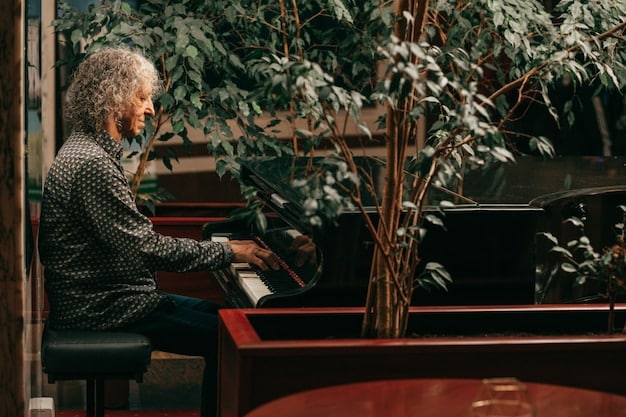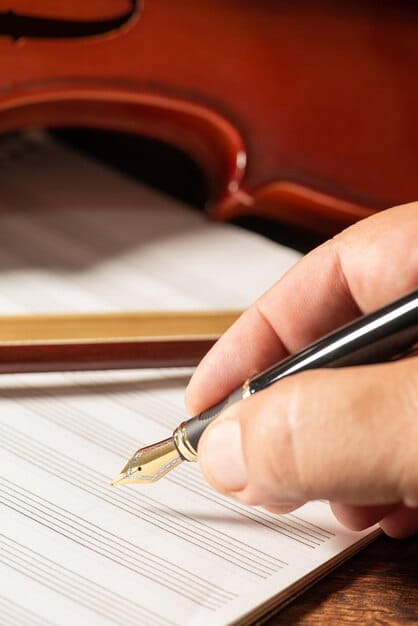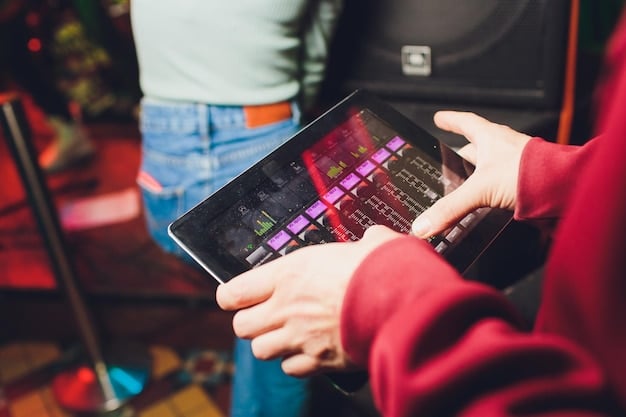Understanding Music Licensing: A Comprehensive Guide for US Songwriters

Understanding music licensing in the US is crucial for songwriters to protect their work, receive royalties, and navigate the complex legal landscape of the music industry effectively.
Navigating the world of music rights can be daunting for songwriters. This guide provides a clear overview of understanding music licensing in the US, ensuring you get properly compensated for your creative work.
What is Music Licensing?
Music licensing is essentially permission granted by the copyright holder to another party to use their music. This use can take many forms, from playing a song in a business to including it in a film or video game.
In the US, music licensing is governed by copyright law, which grants certain exclusive rights to copyright holders, including the right to reproduce, distribute, and publicly perform their works. Understanding these rights is essential for any songwriter.
Types of Music Licenses
There are several types of music licenses, each covering different uses of a song. Here are some of the most common:
- Mechanical License: Allows someone to reproduce and distribute a copyrighted song on CDs, records, tapes, or digital downloads.
- Performance License: Grants the right to publicly perform a song, whether live, on the radio, or in a business.
- Synchronization License: Permits the use of a song in visual media, such as films, TV shows, commercials, and video games.
- Master Use License: Pertains to the use of a specific recording of a song, rather than the composition itself.
Understanding these different types of licenses is crucial for songwriters, as each one generates its own royalty stream and involves different rights holders.
In summary, music licensing is the legal framework that protects songwriters’ rights and ensures they are compensated for the use of their creations. Different licenses cover different uses, and songwriters should be aware of these distinctions.
Copyright Basics for Songwriters
Copyright is a legal right granted to the creator of original works, including musical compositions. In the US, copyright protection is automatic from the moment a song is created and fixed in a tangible form, such as written down or recorded.
However, formally registering your copyright with the US Copyright Office provides additional legal benefits, such as the ability to sue for infringement and collect statutory damages. Let’s delve deeper into what copyright entails for songwriters.
Copyright Ownership
Typically, the songwriter is the initial owner of the copyright in a musical composition. However, there are exceptions, such as when a song is created as a work made for hire. In such cases, the employer owns the copyright.
Copyright can also be transferred through assignment, meaning the songwriter can sell or give away their copyright to another party, such as a music publisher. It’s crucial to understand the terms of any agreement you sign, as it can affect your ownership rights.
Copyright Registration
While copyright protection exists automatically, registering your songs with the US Copyright Office is highly recommended. Here’s why:
- Legal Evidence: Registration creates a public record of your copyright claim.
- Right to Sue: You must register your copyright before you can file a lawsuit for infringement.
- Statutory Damages: If you register your copyright within a certain timeframe, you may be eligible to receive statutory damages and attorney’s fees in an infringement lawsuit.
Registering is a relatively straightforward process that can be done online through the Copyright Office website. Proper registration is a cornerstone of protecting your rights as a songwriter.

Copyright provides songwriters with a bundle of exclusive rights, and registration strengthens their ability to enforce those rights. Understanding copyright ownership and the benefits of registration is vital for any aspiring or professional songwriter.
Understanding Performance Rights Organizations (PROs)
Performance Rights Organizations (PROs) play a critical role in the music licensing ecosystem. These organizations collect performance royalties on behalf of songwriters and publishers when their songs are publicly performed.
In the US, the main PROs are ASCAP, BMI, and SESAC. Each PRO has its own membership requirements, fee structures, and distribution policies. Choosing the right PRO is an important decision for songwriters.
How PROs Work
PROs license the public performance rights of their members’ songs to various users, such as radio stations, TV networks, restaurants, and concert venues. They then collect royalties from these users and distribute them to their members based on the number of times their songs are performed.
Key PROs in the US
Here’s a brief overview of the main PROs in the US:
- ASCAP (American Society of Composers, Authors and Publishers): A member-owned PRO that represents a wide range of songwriters and publishers.
- BMI (Broadcast Music, Inc.): A non-profit PRO that also represents a diverse membership.
- SESAC (Society of European Stage Authors and Composers): An invitation-only PRO known for its selective membership and unique business model.
Each PRO offers slightly different services and operates under different agreements. Songwriters should research each one thoroughly before making a decision.
PROs are essential partners for songwriters, helping them collect royalties they would otherwise miss out on. By understanding how PROs work and choosing the right one, songwriters can maximize their earnings from public performances of their music.
Mechanical Licenses and Royalties
Mechanical licenses grant permission to reproduce and distribute a copyrighted song. This is primarily relevant when someone wants to record a cover version of your song or include it in a compilation album.
In the US, mechanical royalties are typically paid to the songwriter or publisher by the record label or distributor. The amount of the royalty is set by law, but it can be negotiated in certain situations. Let’s examine this in more detail.
The Statutory Rate
The US Copyright Act establishes a statutory rate for mechanical royalties. This rate is periodically adjusted by the Copyright Royalty Board (CRB). As of now, the statutory rate is based on either a per-song or per-minute calculation, whichever is higher.
Staying up-to-date with the current statutory rate is essential for songwriters and publishers when negotiating mechanical licenses.
Obtaining a Mechanical License
Anyone who wants to reproduce and distribute a copyrighted song must obtain a mechanical license. This can be done in a few ways:
- Directly from the Copyright Holder: You can contact the songwriter or publisher directly and negotiate a license agreement.
- Through Harry Fox Agency (HFA): HFA is a licensing agent that represents many publishers and can issue mechanical licenses on their behalf.
- Compulsory License: If a song has already been commercially released, you can obtain a compulsory license by following certain procedures outlined in the Copyright Act.
Each method has its own advantages and disadvantages. Direct negotiation may allow for more flexible terms, while HFA offers a streamlined licensing process.

Mechanical licenses are a key component of the music licensing landscape, providing songwriters with income when their songs are reproduced and distributed. Understanding the statutory rate and the process for obtaining a license is crucial for all parties involved.
Synchronization Licenses for Visual Media
Synchronization licenses, often called “sync licenses,” are required when you want to use a copyrighted song in a visual media project, such as a film, TV show, commercial, or video game.
These licenses are typically negotiated directly with the copyright holder, which is usually the music publisher. The fees for sync licenses can vary widely depending on the popularity of the song, the type of project, and the length of the use. Let’s explore this important license type further.
Negotiating Sync Licenses
Negotiating sync licenses can be complex, as there are many factors that can affect the price. Some of the most important factors include:
- Song’s Popularity: More popular songs typically command higher fees.
- Type of Project: Films and TV shows generally pay more than commercials or video games.
- Length of Use: The longer the song is used, the higher the fee.
- Territory: Worldwide licenses are more expensive than those limited to specific regions.
It’s important to have a clear understanding of your budget and how you plan to use the song before entering into negotiations.
The Role of Music Supervisors
Music supervisors play a key role in the sync licensing process. They are responsible for selecting and licensing music for visual media projects. Music supervisors often have relationships with publishers and can help negotiate license agreements.
Building relationships with music supervisors can be a valuable strategy for songwriters who want to get their music placed in films, TV shows, and other visual media projects.
Synchronization licenses offer songwriters a significant opportunity to generate income and gain exposure. However, navigating the sync licensing process requires a clear understanding of the factors that influence pricing and the role of music supervisors.
Protecting Your Music: Infringement and Enforcement
Protecting your music from unauthorized use is a crucial aspect of being a songwriter. Copyright infringement occurs when someone uses your song without your permission, whether by reproducing, distributing, performing, or creating derivative works.
In the US, copyright law provides several remedies for infringement, including monetary damages and injunctive relief. However, enforcing your copyright can be a complex and costly process. Here’s what you need to know.
What to Do If Your Copyright Is Infringed
If you believe your copyright has been infringed, there are several steps you can take:
- Send a Cease and Desist Letter: A formal letter demanding that the infringing party stop using your song.
- File a Lawsuit: If the infringement continues, you can file a lawsuit in federal court.
- Negotiate a Settlement: Often, it’s possible to reach a settlement agreement with the infringing party, avoiding a costly trial.
It’s important to consult with an attorney experienced in copyright law to determine the best course of action.
Preventing Infringement
While you can’t prevent all instances of infringement, there are steps you can take to reduce the risk:
- Register Your Copyright: As mentioned earlier, registration provides important legal benefits.
- Monitor Online Use: Use tools like Google Alerts to track where your music is being used online.
- Use Digital Watermarks: Embed digital watermarks in your recordings to identify ownership.
Vigilance and proactive measures can help protect your music from unauthorized use.
Copyright infringement can be a serious threat to songwriters’ livelihoods. By understanding your rights and taking steps to protect your music, you can minimize the risk of infringement and enforce your copyright when necessary.
| Key Point | Brief Description |
|---|---|
| 🔑 Copyright Basics | Understand your ownership rights and the benefits of registering your music. |
| 🎵 PROs | Join a Performance Rights Organization to collect performance royalties. |
| 💿 Mechanical Licenses | License reproductions of your songs on formats like CDs and digital downloads. |
| 🎬 Sync Licenses | Negotiate licenses for using your songs in films, TV, and video games. |
Frequently Asked Questions
A compulsory mechanical license allows anyone to reproduce and distribute a song that has already been commercially released, provided they follow specific guidelines and pay the statutory royalty rate to the copyright owner.
You can register your song online through the US Copyright Office website. You’ll need to create an account, complete the online application, pay the registration fee, and upload a copy of your song.
A publisher helps administer copyrights, promote songs, and negotiate licenses. A PRO collects and distributes performance royalties to songwriters and publishers for public performances of their songs.
Yes, you can negotiate a higher sync license fee based on factors like the song’s popularity, the project’s budget, and the intended use. Engaging a music licensing expert can help you navigate these negotiations effectively.
Using music without a license constitutes copyright infringement, which can result in legal action, including monetary damages and injunctive relief. It’s always best to obtain the necessary licenses before using copyrighted music.
Conclusion
Understanding music licensing in the US is essential for songwriters to protect their rights and receive fair compensation for their work. By grasping the basics of copyright, PROs, and various types of licenses, songwriters can navigate the music industry with confidence and ensure their creative endeavors are properly valued.





